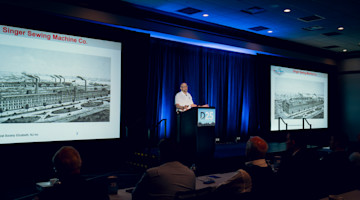January 2025 began with continued uncertainty in the global industrial landscape, as many sectors in Europe and beyond faced challenges likely to persist throughout the year. Ongoing geopolitical instability, particularly the threat of trade conflicts and tariffs, further complicated matters for the European industrial sector. Increased tariffs, especially in the automotive and steel sectors, have disrupted established trade flows, creating a more unpredictable business climate. As a result, some companies are considering relocating to markets with less exposure to tariff risks.
According to manufacturing media outlet MM-Maschinenmarkt, Germany's industrial sector remains fragile, grappling with a mix of stagnation and contraction. The sector concluded 2024 with a series of disappointing results, primarily due to issues within the automotive industry and broader declines in manufacturing output. Industrial production in Germany fell by 2.4% in December, marking its most significant drop since July, with an overall decline of 4.5% for 2024 compared to the previous year.
The decline in energy production, which included an 8.9% drop in the energy sector and a 1.9% decrease in the automotive sector, significantly contributed to this negative performance. Despite this, there was a slight increase in the production of intermediate goods, and a 7% uptick in orders in December offered a glimmer of hope for the coming months. However, experts remain cautious, and the overall forecast for Germany's economic performance in 2025 remains bleak, with predictions of only a 0.7% growth rate.
A study conducted by FTI-Andersch has revealed that Germany's machinery and engineering sector is undergoing considerable restructuring. About 26% of companies are currently restructuring, while 24% plan to do so in the near future. Among those planning changes, 58% focus on realigning their business strategies, 42% consider relocating operations, and 25% plan to reduce production capacity.
Job cuts and reductions in production capacity are expected, with 20% of the workforce in this sector likely to be cut by 2030. Furthermore, geopolitical instability remains a primary concern for many companies, with 43% fearing significant revenue losses due to customer bankruptcies. These concerns reflect a growing perception that Germany's traditional export-driven model is increasingly at risk, prompting many businesses to seek more favorable operating environments abroad.
In contrast, Poland continues to emerge as one of the most attractive markets in Central Europe, with significant investments planned for 2025 and beyond. The country is positioning itself as a key player in logistics, green energy, and artificial intelligence, driving economic diversification and offering opportunities for businesses seeking a stable and growing market in Europe. Among the notable projects is the Baltica 2 offshore wind farm, which has a total investment value of $7.54 billion. This initiative will not only enhance Poland's energy security but also significantly contribute to its renewable energy capacity.
Additionally, the Polish government is focusing on infrastructure development, making the country an appealing destination for investments in logistics, transport, and green technology. Companies looking to expand their operations in these sectors will find a supportive business environment, bolstered by ongoing efforts to modernize Poland's infrastructure and increase its industrial capacity.
A few recently announced projects and investment news items are listed below.
In partnership with Japan Automatic Transmission Co., Nissan is investing $63 million to build a new manufacturing plant in Sunderland in the U.K. This plant will produce powertrains for electric vehicles, aiding Nissan's growth in the EV market, and create 183 high-quality jobs.
Bosch has announced plans to build a new factory to produce small household appliances in Rudna Wielka, Poland. The $630 million project will focus on producing vacuum cleaners and coffee machines, creating 250 jobs.
Poland is increasingly committed to renewable energy, as seen in the construction of the Baltica 2 offshore wind farm. The investment in this phase alone of the project is $2.7 billion. When completed, this offshore wind farm, which will be among the largest in the world, will enhance Poland's energy security and solidify its position as a leader in green energy in Europe.
Enel Green Power has begun construction on the Balbona solar plant in Spain with a total investment of $86 million. This project will create approximately 250 jobs and support the country’s ongoing transition toward renewable energy sources.
Alstom’s industrial center in Trapaga, Bizkaia, has been chosen to deliver three new projects for Germany, Sweden, and the U.K. These projects involve the production of traction systems and converters for a total of 158 trains. The expansion of this facility is a significant development, reflecting the ongoing demand in the transportation and rail sectors.
Alstom is investing $15 million in its newly acquired bogie frame factory located in Matranovak, Hungary. This investment is part of a broader initiative aimed at increasing production capacity by 40% by 2025. Included in this investment is a $1.5 million logistics hall, which is part of the Hungarian government-supported Matranovak 2030 development program. This expansion will enhance Alstom's production capabilities in Central Europe by incorporating modern technology and equipment, such as new welding robots and advanced measurement systems.
For more information, please contact Conchi Aranguren at caranguren@AMTonline.org.






